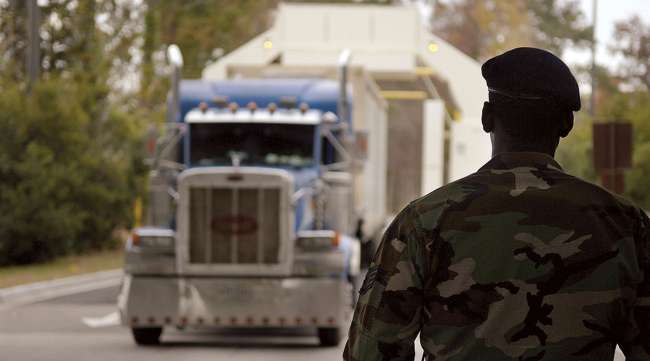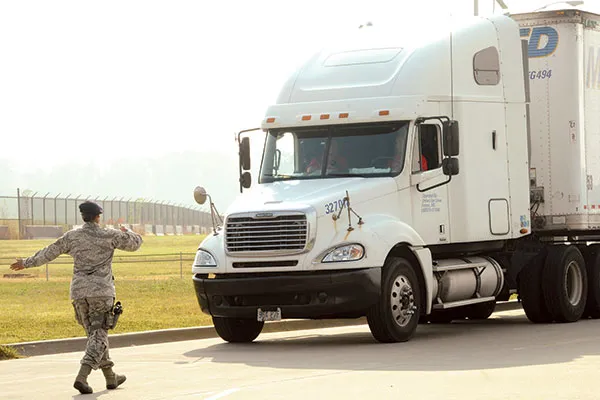Senior Reporter
Senate Defense Bill Includes Freight-Centric Policy

[Stay on top of transportation news: Get TTNews in your inbox.]
WASHINGTON — A must-pass defense policy bill under consideration in the Senate includes a proposal to further facilitate access for trucks to military bases and installations.
The chamber’s Democratic leaders anticipate finalizing their annual defense measure this month. Tucked in the legislative package is a provision mandating the Department of Defense to arrive at certain standards for accessing military installations nationwide.
According to a report prepared by the Armed Services panel that accompanied the Senate legislation, “The committee notes that there is no universal access standard across the services, which can lead to project delays for military construction projects, facilities repairs, and household good moves.” In the report, the committee recommended a provision that would require the secretary of defense to “promulgate guidance within 30 days of enactment of this Act for purposes of establishing final standards for access to installations and to promulgate final guidance not later than 180 days after enactment.”
Earlier this month, the House of Representatives approved its version of the defense bill. The House bill includes a similar provision.
Freight stakeholders, including American Trucking Associations, endorse Congress’ focus related to military installations and bases.
“Such access standards must be consistent across military installations, include procedures to facilitate recurring unescorted access for ‘covered individuals,’ and require [Department of Defense] to accept credentials that already exist for non-DOD personnel, such as the Department of Homeland Security’s Transportation Worker Identification Credential,” ATA, ATA’s Moving & Storage Conference, ATA's Government Freight Conference and the HomeSafe Alliance wrote to the congressional Armed Services committees recently.
“To be clear, truck drivers, motor carriers and household goods movers are [Department of Defense] partners, they are generally vetted by the federal government, and many have security clearances and/or other federally recognized security credentials,” the groups continued.
Enhancing access at military bases and federal facilities for drivers via credentialing is a key priority for ATA and its affiliates. Stakeholders champion efforts designed to assist companies that move household goods for military and civilian personnel.
The defense bill’s consideration in the Senate is led by Sens. Jack Reed (D-R.I.) and Roger Wicker (R-Miss.). They are chairman and ranking member, respectively, of the Senate Armed Services Committee.
“This bipartisan bill makes real progress,” Reed said July 11. “It addresses a broad range of pressing issues, from strategic competition with China and Russia, to disruptive technologies like hypersonics, [artificial intelligence], and quantum computing, to modernizing our ships, aircraft, and combat vehicles.”

The Senate defense bill’s consideration is led by Reed (left) and Wicker. “This bipartisan bill makes real progress,” Reed said on July 11. (U.S. Senate)
“This year’s defense bill includes many key provisions to maintain deterrence and modernize our armed forces,” Wicker added.
With the August recess fast approaching, Senate Majority Leader Chuck Schumer (D-N.Y.) called on colleagues to promptly give bipartisan approval to the legislation. He has yet to schedule a vote on the bill’s final passage. Regardless of which parties hold power, each year the National Defense Authorization Act traditionally is cleared by both houses for the president’s desk.
“We have every reason in the world to finish the NDAA bill quickly because there’s a lot both sides can celebrate in this year’s bill,” Schumer said. “Many of the NDAA’s provisions might typically fly under the radar because they seem incremental, but in their totality, they make a huge difference in our country.”

A truck is directed by security before entering Scott Air Force Base in Illinois. American Trucking Associations endorses Congress’ focus related to military installations and bases. (Tristin English/U.S. Air Force)
“In the Senate, Democrats and Republicans have worked together, mindful of the importance to preserve our national security, while the process in the House, unfortunately, was sadly delayed and at times derailed by wildly partisan and irrelevant hard right amendments that have nothing to do with defense,” Schumer went on, pointing to the House proceedings before passing the bill 219-210.
Want more news? Listen to today's daily briefing below or go here for more info:




